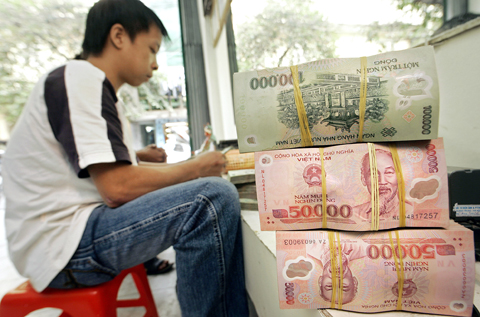Vietnam’s central bank yesterday devalued the dong for the second time in three months amid widespread concerns over a high trade deficit and inflation.
The average interbank rate on Thursday was 18,544 dong per US dollar, against 17,941 the previous day, a fall of 3.4 percent, the State Bank of Vietnam (SBV) said.
It said the decision was taken to balance supply and demand, and increase flows in the foreign exchange market “while contributing to controlling the trade deficit and stabilizing the macroeconomy.”

PHOTO: AFP
Vietnam’s trade deficit reached US$12.2 billion last year.
The central bank maintained the 3 percent daily trading band for buying and selling US dollars by commercial banks. Because the band remains unchanged there was no official devaluation, a banker said, but in practice the new interbank rate means the dong loses value, “so we can say it’s a devaluation.”
Devaluation coupled with lower interest rates aims to encourage businesses to sell dollars to banks, said the banker, who declined to be named.
“This [interbank] rate might be maintained in the next few months in order for the state to control the trade deficit,” she said.
Vietnam’s trade suffered during last year’s global financial crisis.
In November the central bank effectively devalued the dong by 5.4 percent and reduced the trading band from 5 percent.
Hanoi also late last year ordered companies to sell US dollars to state banks, after months of official intervention to prop up the local unit.
Singapore-based DBS Group Research said yesterday’s move should not be seen as a surprise and is likely to be followed by more devaluation during the year.
“Under the circumstances, we remain comfortable with our end-2010 target of 19,640,” DBS said.
Vietnam’s economy grew 5.32 percent last year, but that expansion came with a budget deficit that official data said reached 7 percent of GDP.
Consumer prices rose 7.62 percent year-on-year last month, higher than the government’s target for this year of below 7 percent, official figures showed.
The latest devaluation came during a period of high demand for cash before a week-long Lunar New Year holiday.
In its order yesterday, the SBV also set the maximum interest rate for corporate dollar saving accounts at a maximum of 1 percent, less than lenders had been offering.

When an apartment comes up for rent in Germany’s big cities, hundreds of prospective tenants often queue down the street to view it, but the acute shortage of affordable housing is getting scant attention ahead of today’s snap general election. “Housing is one of the main problems for people, but nobody talks about it, nobody takes it seriously,” said Andreas Ibel, president of Build Europe, an association representing housing developers. Migration and the sluggish economy top the list of voters’ concerns, but analysts say housing policy fails to break through as returns on investment take time to register, making the

EARLY TALKS: Measures under consideration include convincing allies to match US curbs, further restricting exports of AI chips or GPUs, and blocking Chinese investments US President Donald Trump’s administration is sketching out tougher versions of US semiconductor curbs and pressuring key allies to escalate their restrictions on China’s chip industry, an early indication the new US president plans to expand efforts that began under former US president Joe Biden to limit Beijing’s technological prowess. Trump officials recently met with their Japanese and Dutch counterparts about restricting Tokyo Electron Ltd and ASML Holding NV engineers from maintaining semiconductor gear in China, people familiar with the matter said. The aim, which was also a priority for Biden, is to see key allies match China curbs the US

NOT TO WORRY: Some people are concerned funds might continue moving out of the country, but the central bank said financial account outflows are not unusual in Taiwan Taiwan’s outbound investments hit a new high last year due to investments made by contract chipmaker Taiwan Semiconductor Manufacturing Co (TSMC, 台積電) and other major manufacturers to boost global expansion, the central bank said on Thursday. The net increase in outbound investments last year reached a record US$21.05 billion, while the net increase in outbound investments by Taiwanese residents reached a record US$31.98 billion, central bank data showed. Chen Fei-wen (陳斐紋), deputy director of the central bank’s Department of Economic Research, said the increase was largely due to TSMC’s efforts to expand production in the US and Japan. Investments by Vanguard International

‘SACRED MOUNTAIN’: The chipmaker can form joint ventures abroad, except in China, but like other firms, it needs government approval for large investments Taiwan Semiconductor Manufacturing Co (TSMC, 台積電) needs government permission for any overseas joint ventures (JVs), but there are no restrictions on making the most advanced chips overseas other than for China, Minister of Economic Affairs J.W. Kuo (郭智輝) said yesterday. US media have said that TSMC, the world’s largest contract chipmaker and a major supplier to companies such as Apple Inc and Nvidia Corp, has been in talks for a stake in Intel Corp. Neither company has confirmed the talks, but US President Donald Trump has accused Taiwan of taking away the US’ semiconductor business and said he wants the industry back